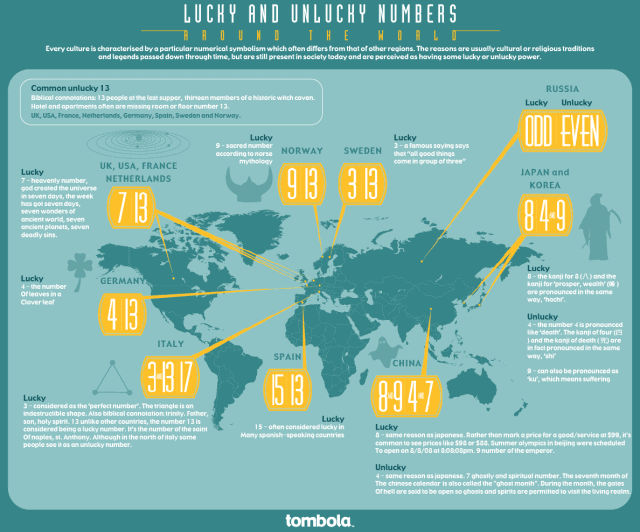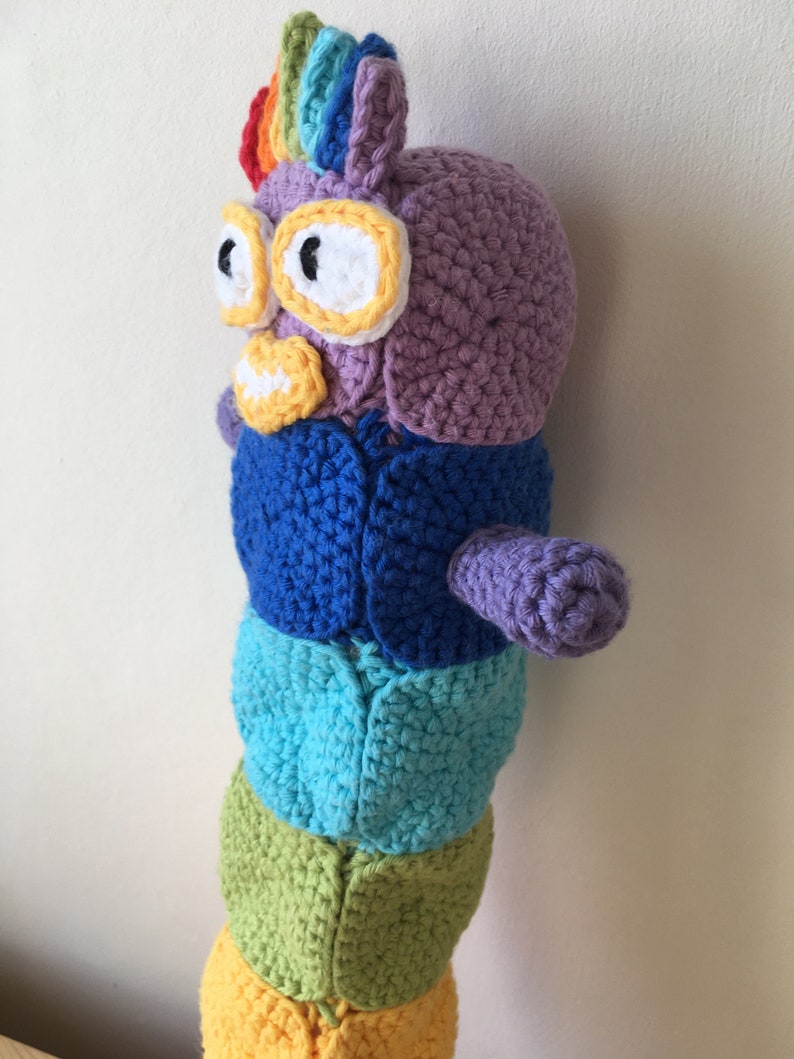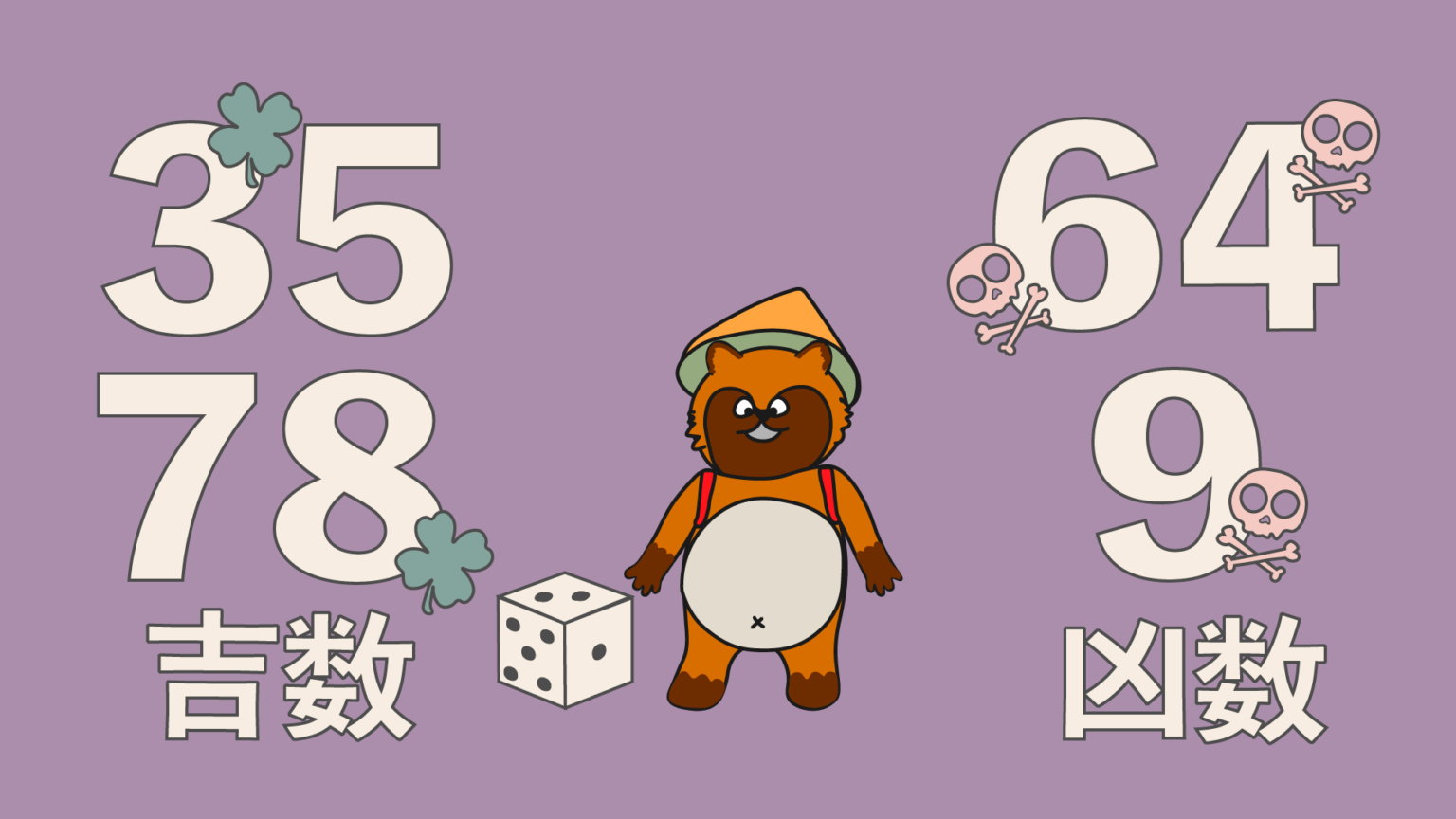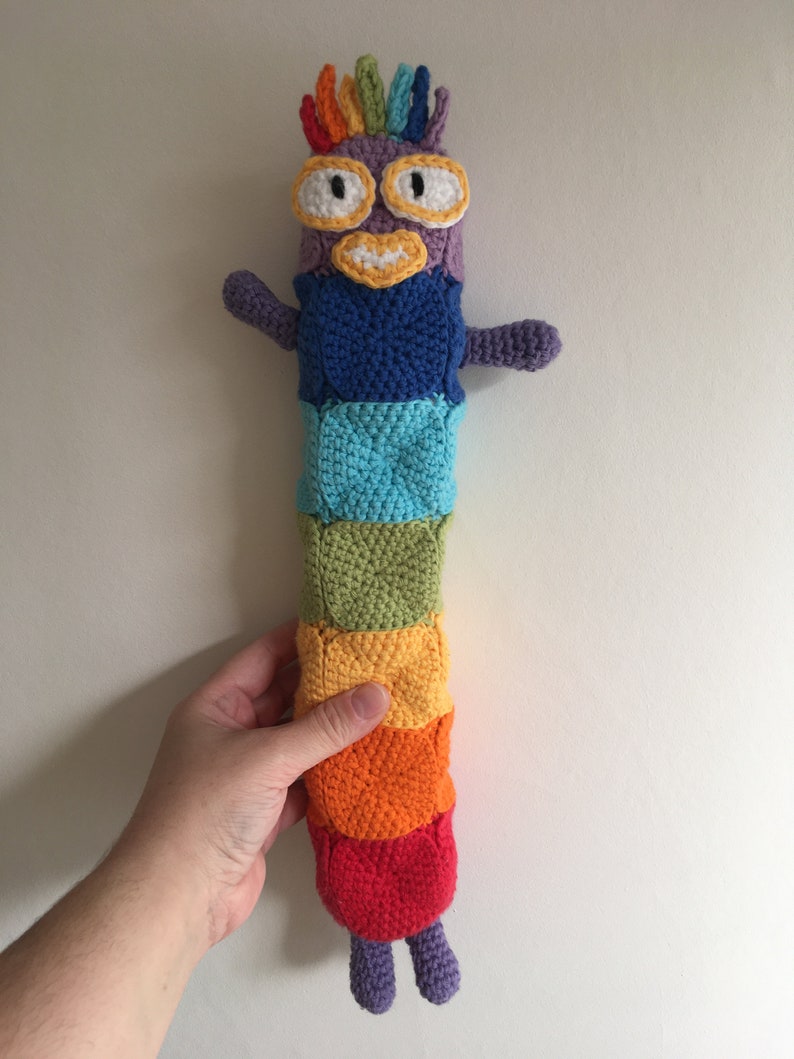It seems the number 4 is in fourth place, but surprisingly, unlike number 8, it calls for bad luck in the Far East. The pronunciation of the number four in Japanese is very similar to the word "death." Because of this, four have been considered bad luck in Japan, Korea, and China. It is often deemed to be terrible luck to give a gift made up of four pieces to someone. Many buildings with dominantly Asian populations do not have the fourth floor, much like the number 13 in parts of North America.
You might find a hotel without a 4th floor or a product line without a series 4. For example, Nokia mobiles went from series 3 to series 5 product range. In Western culture, four isn't necessarily considered lucky or unlucky; however, there are a few unlucky fours.
Like 5, 7 has both positive and negative connotations in Chinese culture. For the positive side, 七 sounds like both 起 (qǐ), which means "start" or "rise", and also 气 (qì), which means "vital energy". Seven is also seen as a lucky number for relationships. The Qixi Festival (七夕節), also known as the Chinese Valentine's Day, falls on the 7th day of the 7th month in the lunar calendar.
Is 7 Considered Lucky The 7th month is also known as the "ghost month" in China, where ghosts and spirits are believed to rise from hell to visit earth. While ghosts may be seen as omens, the ghost festival in the 7th month is widely celebrated. 7 may also be considered unlucky because 七 sounds like 欺 , meaning "cheat".
4 is well known to be an unlucky number because 四 sounds similar to 死 (sǐ), which means "death" in Chinese. People will go to extremes based on superstitions of the number 4. Houses and apartments that have 4 in the address number will sell for much less than ones without. Mentioning the number four to an ill family member is considered to be highly offensive, and giving anything with 4 on it to someone can be seen as a death threat. 13 is one of the most controversial numbers and often divides the opinion of the numerologists.
Some experts believe that house number 13 in Indian numerology will bring bad luck to the house owner and thus should be avoided altogether. On the other hand, house number 13 Feng Shui is not considered unlucky and neutral. Which reasoning is valid and should be followed depends on the individual Indeed, people who believe in house number numerology always have a strong opinion about the number 13. Whether inspired by biblical stories or the legends of ancient people, these so-called lucky or unlucky properties assigned to numbers have real meaning to many people. Based on little more than a story, where the origin is often unknown, people will alter travel plans, delay purchases or spend their life savings on lottery tickets. Wonder where these numbers earned their reputations?
Read on to learn about some of the most popular superstitions in the world of numbers. It seems that every culture has lucky numbers and unlucky numbers. In Japan, four and nine are considered unlucky numbers because of their pronunciation.
Four is pronounced "shi," which is the same pronunciation as death. Nine is pronounced "ku," which has the same pronunciation as agony or torture. In fact, some hospitals and apartments don't have rooms numbered "4" or "9". Some vehicle identification numbers are restricted on Japanese license plates, unless someone requests them. For example, 42 and 49 at the end of plates, which are linked to the words for "death (shini 死に)" and "to run over (shiku 轢く)". The full sequences 42-19, (proceeding to death 死に行く) and (time to die 死に頃) are also restricted.
Learn more about unlucky Japanese numbers on my "Question of the Week" page. If you are not familiar with Japanese numbers, check out our page for learning Japanese numbers. In a world where the majority of people don't identify themselves as particularly superstitious, it's astounding just how much impact superstitions about numbers can have on the economy.
I was shocked to learn that businesses lose almost a billion dollars each time the 13th of the month just happens to fall on a Friday. While researching this article, I also learned that people in some Asian countries will pay a premium simply for a license plate or street address that contains a lucky number. Manufacturers and retailers have caught on as well, assigning random prices to products that rely more on the inclusion of lucky numbers than on any retail strategy or research.
In many cultures around the world, seven is considered a lucky number. In fact, if you start looking for reasons why seven is so popular throughout history across various cultures, you'll find that the number seems to appear everywhere. In fact, if you start looking for reasons why seven is so popular throughout history across various cultures, you'll find that the number seems to appear everywhere. It is often said that numbers and mathematics rule the universe and the person who understands the importance of certain numbers, will have complete control over their life. Today, house number numerology has gained immense popularity globally. 6 is pronounced "liu" in Mandarin Chinese, and this sounds like the Mandarin Chinese word meaning "flowing, smooth, or frictionless".
Therefore, the number 6 has the meaning of "everything will go smoothly" and is considered lucky especially where it occurs in multiples. In feng shui, the number 6 represents authority and power. Forget individual numbers — the very act of counting itself comes with a series of positive and negative superstitions.
One folk remedy suggests that counting the number of warts on your body and revealing the number to a stranger will cause the warts to go away. Of course, you should never count money, your children or your possessions, as this can make them go away as well. The same is true for livestock — like counting chickens before they hatch — as well as fish and gambling winnings. Some superstitious types claim that weighing babies at birth also brings bad luck, as does counting the stones in ancient monuments. Is well known to be an unlucky number because 四 sounds similar to 死 (sǐ), which means "death" in Chinese.
Did you know that if you press a Chinese elevator button to go to the 50th floor of a building, you may actually only be going to the 35th floor? This is because many buildings in China not only omit the 13th floor, but are also missing any floor containing the number 4, which is considered to be the unluckiest number in Chinese culture. The Chinese have many superstitions about numbers, often related to similar-sounding words in the Chinese language, which are called homophones. But in cultures in Asia, the pronunciation of 666 sounds very much like the phrase, "things going smoothly," and it is considered to be very lucky.
The numbers which exert a bad impact on one's life are called unlucky numbers. Unlucky numbers depend on someone's belief or experience with that particular number. In Chinese numerology, there are lucky numbers, unlucky numbers, and neutral numbers. Of course, context is very important when selecting numbers, and there are many ways to interpret them from one situation to another. One can communicate a subtle message to another person or make a big announcement with numbers, especially when it comes to date and time selection.
For example, the Beijing Olympics began on August 8, 2008, with the ceremony beginning at 8 minutes and 8 seconds after 8 p.m. 8 is a popular number amongst business people, senior managers and sportspersons. If you wonder why so many successful people are fixated on number 8 house Feng Shui, it is easy; the number promotes abundance and ambition. Many people prefer house number 8 in Indian numerology as they believe that the number will perfectly compliment their personal and professional growth goals. Some people leapfrog towards financial freedom, stable family and always have their next goal-to-achieve penned down.
8 house number numerology invites prosperity and wealth of epic proportions. It's the stuff of legends for gamblers and lottery fans — and the universal symbol for slot machines and big Vegas jackpots. Wondering where the number gained its lucky reputation? It could be simply due to the fact that seven stands alone out of all the single-digit numbers; it's not divisible by anything, including five, making it powerful. It could also be attributed to the role that the number seven has played in history, culture and legend. God took seven days to create the world, the ancient world had seven planets and there are seven seas, seven wonders of the world and seven days of the week.
Seek out the seventh son of a seventh son; he is supposed to have magical abilities, including healing powers and an unending pool of luck. 3 (三), pronounced san, is considered lucky due to its similarity in sound to the word that means birth. Additionally, this number represents the three stages in the life of humans - birth, marriage, death - that adds to its importance in Chinese culture. Because of its negative association with death, most people consider this number to be so unlucky that many buildings in China do not even have a "fourth" floor.
The number 4 is also unlikely to appear on house/door numbers and car license plates. Whenever, possible, many people will also try hard to avoid choosing telephone numbers that contain the number 4. The seven Classical planets resulted in seven being the number of days in a week. It is often considered lucky in Western culture and is often seen as highly symbolic. Unlike Western culture, in Vietnamese culture, the number seven is sometimes considered unlucky.
What is an ideal house environment to raise kids? This is a question that troubles almost every young couple on the verge of parenthood. Thankfully, there is a solution if you believe in house number numerology. House number 6 is the most suitable house if you want your children, grandchildren, and pets to live a happy and prosperous life.
Feng Shui recognises 6 as a number that promotes calmness. Owners with house number 6 Feng Shui are thus perfect for people with a calm mind and less adventurous life. It is an ideal house to create a lifetime's worth of memories with family and people who work in the healthcare service industry. Social workers, nurses, doctors, senior citizens should live house number 6 for a great life.
The number 1 is considered the beginning of a journey and is regarded as a good number for the house. This number is suitable for self-employed and single people who are just starting their personal or professional life journey. House number 1 in Indian numerology denotes a strong sense of independence and ambition. People who have a great sense of curiosity and the urge to reach newer heights in whatever work they are doing are best suited with house number numerology 1.
It is also considered as an auspicious number in Feng Shui. Owners residing in house number 1 Feng Shui are destined for a positive start in any new journey that they are about to partake in personal or professional life. In Italy, the number 17 is as unlucky as 13 is to Americans — for very good reason.
The Italians write 17 as XVII, which can be rearranged to form VIXI, which roughly translates to "I'm now dead" or "my life is over." Not a pleasant thought. Carmakers and other manufacturers avoid using the number when naming products or assigning model numbers, just in case. Ironically, the dreaded 13 is actually considered lucky in Italy, despite its reputation in many other parts of the world.
Some selected numbers may have come to the front due to their numerical properties. For instance, "Pi" and "e" (Euler's number) come in the 18th and 28th place respectively in the list of the most preferable numbers. It is not surprising why the Pi number made it into the list considering its reputation. This number, whose number of digits after the decimal point has not yet been determined and have thought to extend to infinity, is considered sacred by many people. Assuming that it has a purely random property, if pi is long enough, you can find every string of digits in your life in pi. So your birthday, phone numbers, or any number you randomly type in are somewhere in the pi.
With a code that can convert letters and numbers, you can theoretically find the name of any person or institution, a word, a sentence, or even a book, in the number pi. Those who think that all life is represented inside this number are not few. According to Guinnes Book of records, the record on memorizing pi belongs to a Chinese named Lu Chao with 67,890 digits and it took him 24 hours and 4 minutes to recite all the digits.
In 2006, a Japanese named Akira Haraguchi said that he memorized 100,000 digits after the decimal point in almost 18 hours, but this was not officially validated by Guinness. Others believe it is because of the tie-in with 13 and the lunar cycle. 13 is the exact number of full moons in a calendar year, and since people have thought that the moon controls emotion and makes people a bit crazy, then 13 is bad luck. In many Persian cultures, 13 is unlucky as well, showing that this superstition crosses cultural borders.
And of course, Friday the 13th is considered very bad luck. In China, lucky numbers have pronunciations that are similar to words with lucky meanings. Number 8 holds huge significance as a lucky number. To a lesser extent 2, 6, and 9 are considered lucky.
As well as these general number superstitions, fengshui and the Chinese zodiac dictate different number luck for different places/people. Chinese numerology might seem like an obscure field, but this unique set of beliefs plays a big role in modern Chinese culture. Read this article to gain insight into this quirky aspect of modern Chinese life. 7 was widely used in ancient Chinese culture, for example the Seven Treasures for Buddhist Scripture refer to gold, silver, colored glaze, coral, amber, seashell, and agate. Another example is the Double Seventh Festivalwhen the Milky Way Lovers can have their annual meeting only on July 7th. Therefore, July 7th is regarded as the Chinese Valentine's Day.
Though 13 has a long but foggy history of association with bad luck in Western societies, it's not the only number to be imbued with irrational meaning. Here are 13 other numbers that people have fixated on as lucky, unlucky or just plain evil. In fact, the Chinese are so superstitious about numbers, that they will often spend big money for "lucky numbers" in their life. A man in Hangzhou listed his license plate, A8888, for $140,000 online. Your apartment number, your cell phone number, your license plate—all are avenues to invite good luck or protect against bad luck in Chinese culture.






















No comments:
Post a Comment
Note: Only a member of this blog may post a comment.